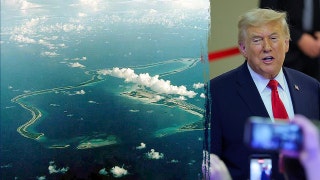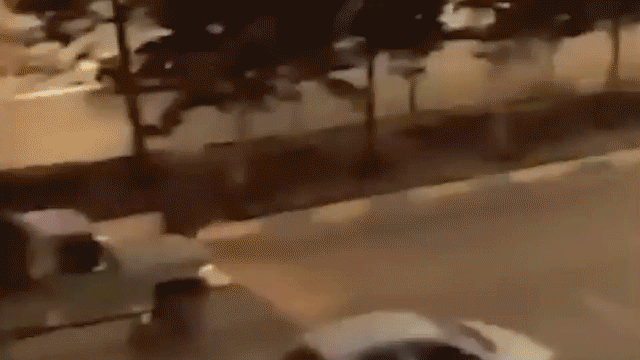SAO PAULO – A tenuous six-year truce between police and gang members is over in Sao Paulo — that much seems clear to shopkeeper Vanuza Alves da Silva, who has seen a surge in killings in her slum neighborhood.
Seven people were killed in a single night last week in Silva's Vila Brasilandia shantytown, including a police officer. Days later, gunmen shot up a bar, killing a 13-year-old boy and three adults.
Blood isn't flowing just in her slum. Sao Paulo, which is to host the World Cup opening match in 2014, has seen nearly 150 homicides over the past two weeks and 94 police executed this year.
"It's a war here. Last week I was on a bus when a shootout began on the street. There was no escape. We didn't know if we should flee the bus or stay inside," Silva said at her modest all-purpose shop in Vila Brasilandia. "There were bullets everywhere, so I stayed inside."
Behind the violence, security experts say, is a powerful prison-based gang, the First Capital Command, which likely feels the government has violated an informal agreement, long denied by officials, to slow the prison transfers of gang leaders and limit crackdowns on its operations on Sao Paulo's outskirts in exchange for an end to gang violence.
In the past two weeks, Sao Paulo's metropolitan area has seen more than 10 killings a day, almost double the normal average of six.
Efforts to transfer high-ranking imprisoned members of the gang, known by its Portuguese initials PCC, to far off prisons where they would have difficulty giving orders by cellphone to their soldiers on the outside enraged the gang in 2006.
Five days of gang-inspired attacks then left at least 175 dead, including police officers, traffickers and the innocent in between. After the violence lingered for months, an alleged informal truce between the government and the PCC slowed the transfers and the attacks tapered off.
"This year the government broke its 2006 truce," said Walter Maierovitch, Brazil's former drug czar and organized crime expert. "The violence we're seeing now is the PCC's response to the end of the truce and the violent reaction of police who don't hesitate to execute real and imagined suspects out of a feeling of revenge."
There are fears the gang will now go beyond the carnage of 2006, and that has this metropolitan area of 20 million people on edge.
In the last six months, a series of police raids have killed dozens of suspected gang members, while nearly all the officers killed have been executed while they were off duty, at times in front of their families. Officials say phone intercepts of gang leaders' calls from prison and handwritten orders show that the gang is behind the execution of the police officers.
Authorities recently renewed efforts to transfer the gang's leaders to prisons outside Sao Paulo state. The Justice Ministry on Wednesday authorized sending one of the PCC's top figures to a maximum security prison in Roraima state, 900 miles (1,450 kilometers) to the northwest in the Amazon.
That order came after 24 hours of relative calm in which Sao Paulo had just one homicide. Few expect the calm to hold after Wednesday's transfer order, but officials held their ground on moving prisoners to far-off locations.
"Isolation for these prisoners is crucial," Sao Paulo state Gov. Geraldo Alckmin said this week. "Italy only made progress in combatting the Mafia when it stiffened penalties up to life imprisonment and isolated the leaders."
While drug gangs in the slums of Rio de Janeiro draw international attention by parading around the shantytowns toting high-powered rifles, giving interviews and carrying out Hollywood-worthy battles with police, the PCC is all business. The Sao Paulo gang detests attention and remains mostly in the shadows of the slums where it holds sway, ruling on reputation and fear, maintaining a mafia-like stance.
"The PCC is better organized, more powerful, and they have a monopoly of crimes and power which is something nobody achieved in Rio," said Ignacio Cano, a researcher at the Violence Analysis Center at Rio de Janeiro State University. "They are by far the strongest criminal group in Brazil."
The gang was founded in 1993 by hardened criminals inside Sao Paulo's Taubate Penitentiary, but remained a relatively obscure group until early 2001, when uprisings in 29 prisons across the state killed 19 inmates. It was the biggest prison rebellion in Brazil's recent history and took police 27 hours to crush.
The PCC was formed to pressure for improved prison conditions. Brazilian Justice Minister Jose Cardozo, speaking at a security conference this week, said he would "prefer to die" than serve time in his nation's prisons. He added: "We have a medieval penal system."
While the gang's start may have been rooted in fighting for basic human rights of the imprisoned, its members quickly began using their power inside prisons to direct drug-dealing and extortion operations on the outside.
There are no official numbers on the gang's size, but the inner core considered as members is thought to include no more than a few thousand people, Cano said.
Last month, police documents obtained by the newspaper Folha de S. Paulo indicated the gang's members numbered just over 1,300, and showed they are required to pay $300 in monthly fees in exchange for legal aid if they're arrested and support for their families if they go to jail.
What makes the PCC so powerful is that corporate approach to how it manages gang enterprises as well as its reach beyond its core membership.
"They outsource. They contract people and allow them to carry out certain activities as long as they're paying them (the PCC) something in return," Cano said. "For example, in 2006 many people say the killings of policemen were outsourced."
Estimates of the number of people connected in some way to the gang go as high as 100,000.
The security experts, Cano and Maierovitch, both agree that violence will escalate if police continue a hardline approach against the PCC, and if there is a perception that political leaders are closing their eyes to excessive force or killings carried out by officers against suspected gang members.
An amateur video aired by the Globo TV network this week is likely to increase the backlash.
It shows police escorting a suspect out of his home in a poor Sao Paulo neighborhood. With the man in the street and surrounded by five officers, one policeman points his gun at the suspect. In that instant, two shots are fired, but the person taking the video is blocked, obscuring the scene.
The man was later reported by police as being killed during a gunbattle. But investigators on Wednesday requested that the officers involved be taken into custody while an investigation continues, a request a judge had not yet ruled on.
A police spokeswoman said the department had no comment on the case.
Back in the Vila Brasilandia slum, shopkeeper Silva said that while police and the gang battle, those caught in the crossfire are feeling the pain.
"The average person ends up being the real target — and we don't know who is the criminal and who is the police," she said.
___
Associated Press writer Stan Lehman contributed to this report.








































